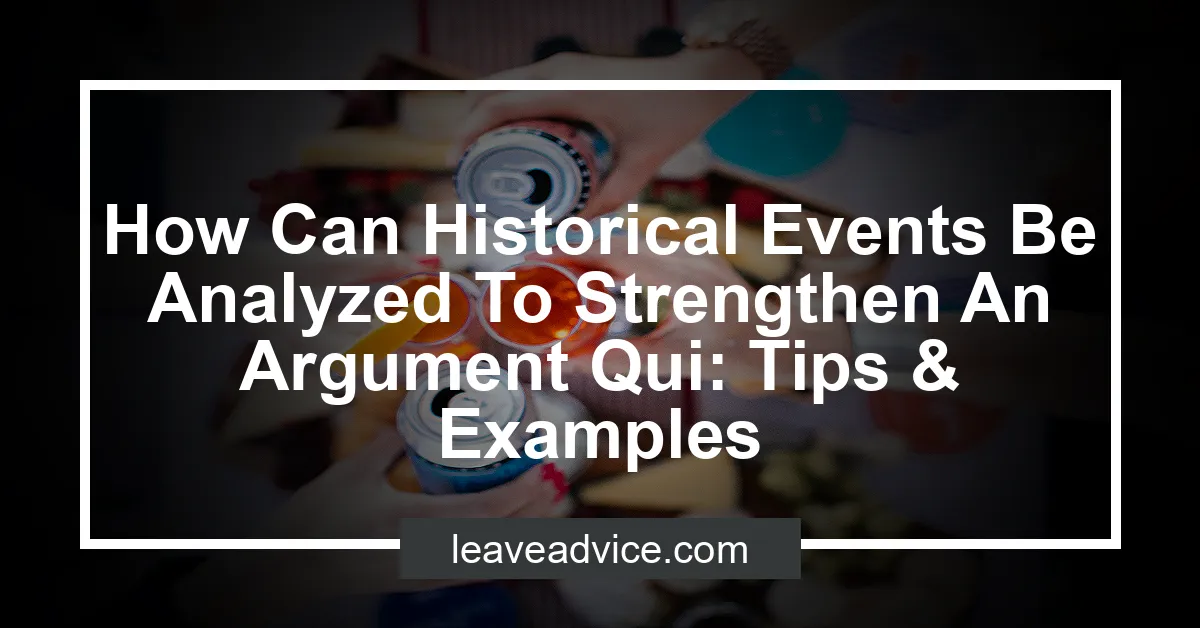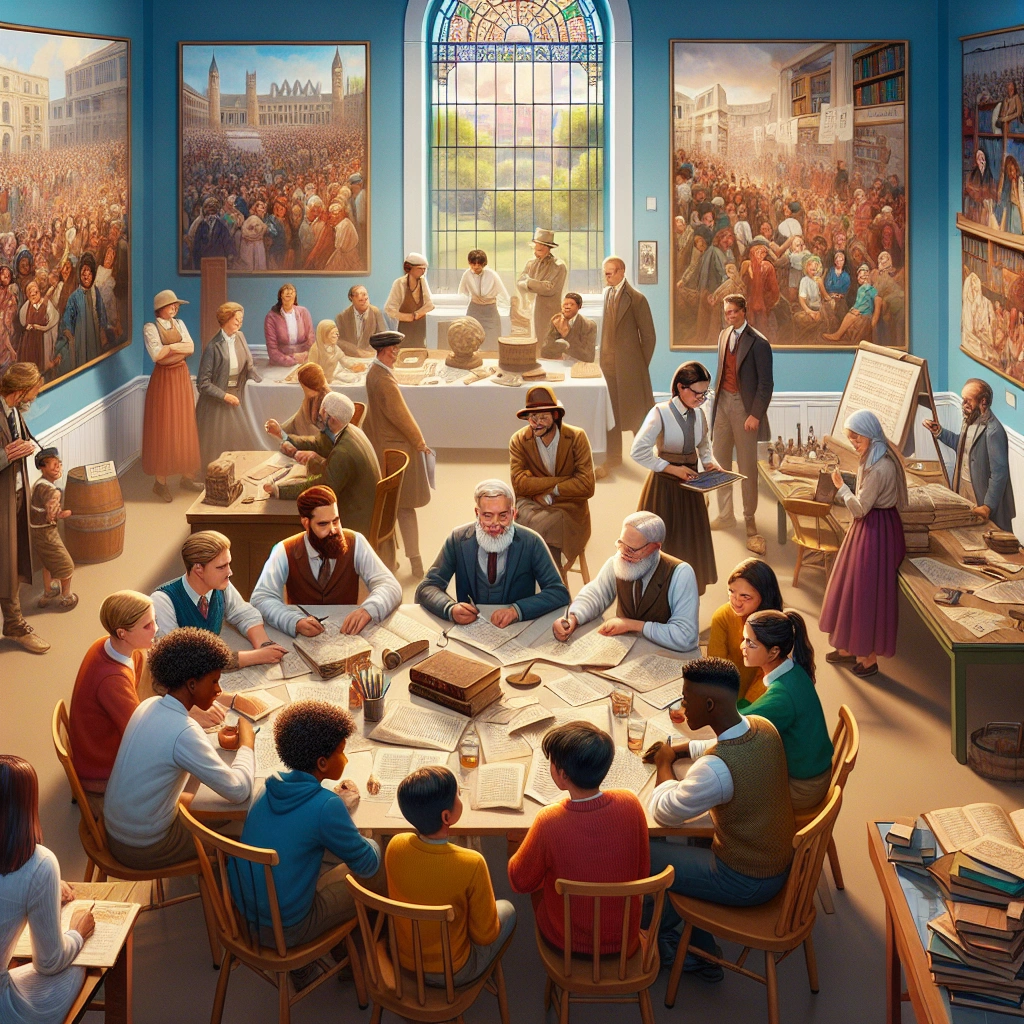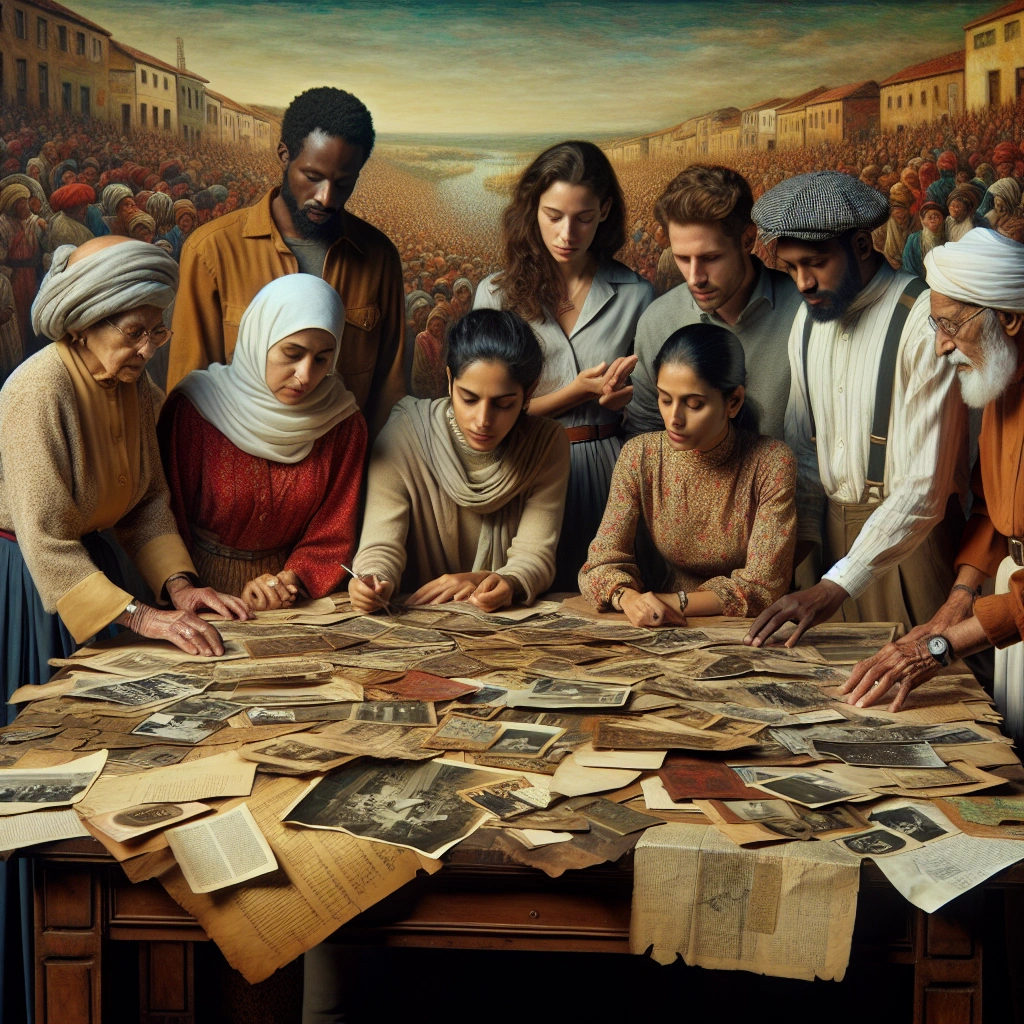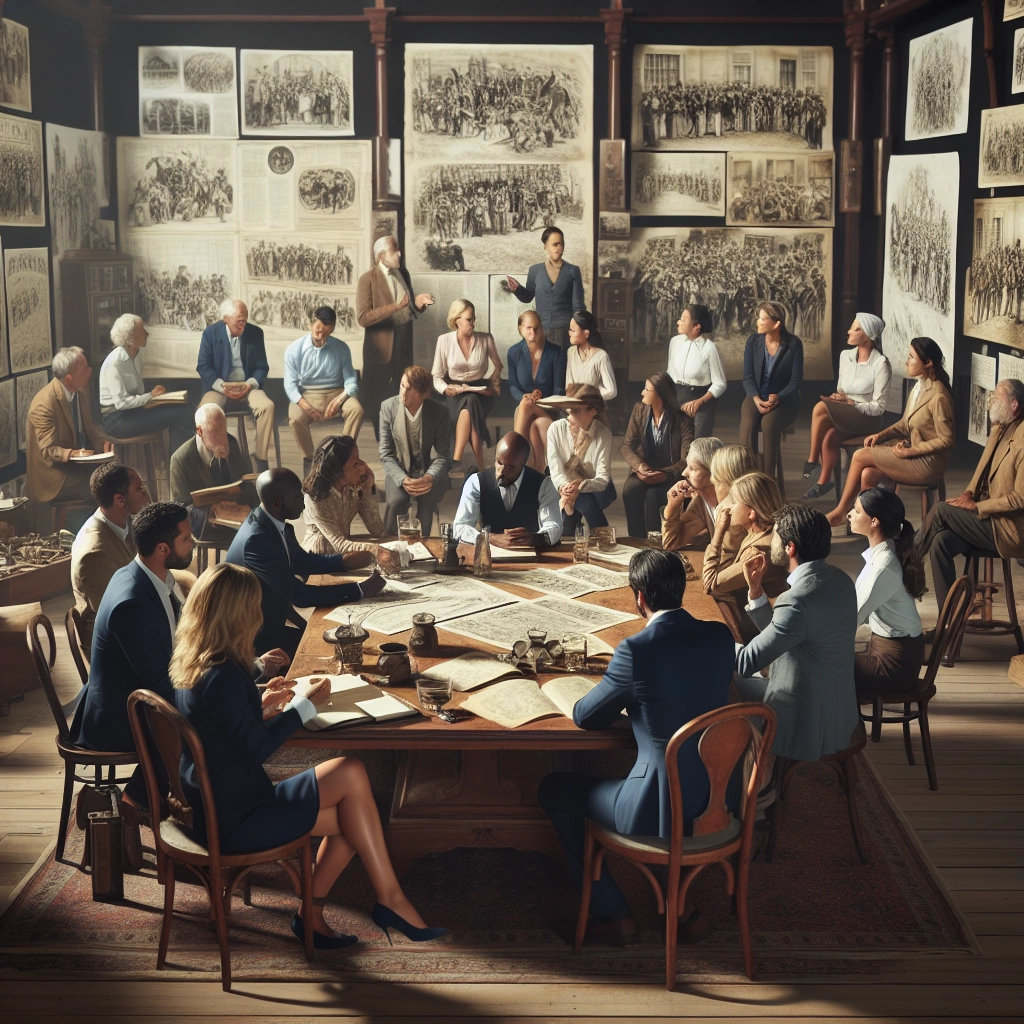How Can Historical Events Be Analyzed To Strengthen An Argument Qui: Tips & Examples


Historical events can be analyzed to strengthen an argument by examining evidence from the past to create a deeper understanding. This involves analyzing cause-and-effect relationships, considering the ways individuals, influential ideas, and different mindsets interact and affect one another.
By using historical analysis, scholars can develop informed hypotheses grounded in historical evidence to support their arguments. Historical analysis is also about constructing a narrative built on reliable evidence to ensure more objective understandings of the past.
It requires following and evaluating arguments and arriving at usable conclusions based on available evidence, which helps to strengthen the argument. By using historical thinking skills, scholars can distinguish between unsupported expressions of opinion and informed hypotheses, and challenge arguments of historical inevitability.
Check out this Youtube video: “How can historical events be analyzed to strengthen an argument?” This video will help you learn how to generate evidence for the argument prompt in AP Lang Q3.
Understanding Historical Context
Understanding the historical context of an event is crucial as it provides valuable insights into the motivations and actions of people in the past. By delving into historical context, we can gain a deeper understanding of how events were shaped by the unique conditions and circumstances of the time.
This understanding helps in developing empathy and prevents us from judging the past with modern standards.
Importance of understanding the historical context of an event
The importance of understanding historical context lies in its ability to facilitate a comprehensive comprehension of past events and the reasons behind actions taken. It aids in avoiding the imposition of present-day values and allows a more accurate interpretation of historical occurrences.
By grasping the historical context, individuals can comprehend the societal, religious, economic, and political conditions that prevailed during pertinent events, fostering a more profound understanding of the past.
Examples of historical events that have shaped modern arguments
Several historical events have significantly influenced contemporary arguments and viewpoints. For instance, the Civil Rights Movement in the United States has shaped modern discussions on racial equality and social justice.
The French Revolution continues to influence debates concerning governance, democracy, and equality. Both world wars have left a lasting impact on international relations, shaping discussions on peace, security, and diplomacy in modern times.
| Historical Event | Modern Impact |
|---|---|
| Civil Rights Movement | Racial Equality and Social Justice |
| French Revolution | Governance, Democracy, and Equality |
| World Wars | International Relations, Peace, and Security |
These examples demonstrate how understanding historical contexts can provide invaluable insights for fostering contemporary arguments and shaping modern perspectives.
Identifying Key Historical Events
Historical events play a crucial role in strengthening any argument, providing a solid foundation to support the narrative. Identifying key historical events relevant to the argument involves pinpointing pivotal moments that directly influenced the context under discussion.
For example, when exploring the impact of technological advancements on society, the Industrial Revolution serves as a prime historical event that dramatically altered the course of human history.
Understanding the significance of historical events is achieved by evaluating their long-term impact on society, culture, and governance. It entails assessing how these events have shaped the current state of affairs and influenced the trajectory of human development.
One way to determine the significance is by examining how these events have transformed societal norms, political structures, and technological advancements over time.
| Historical Event | Relevance to Argument |
|---|---|
| Discovery of the New World | Demonstrates the impact of exploration on global trade and cultural exchange. |
| Women’s Suffrage Movement | Showcases the struggle for equal rights and its enduring impact on gender equality. |
Determining the significance of historical events involves carefully dissecting their multifaceted impact and ongoing relevance to contemporary issues. By identifying and analyzing these key historical events, we can effectively strengthen our arguments and provide a comprehensive understanding of the context we seek to address.
Analyzing Historical Events
Analyzing the causes and consequences of historical events
Historical events can be analyzed by examining the causes that led to their occurrence and understanding the far-reaching consequences they produced. For example, the causes of World War II include the Treaty of Versailles, economic instability, and the rise of totalitarian regimes.
On the other hand, its consequences encompass the establishment of the United Nations, Cold War tensions, and the formation of new nation-states. By delving into these causes and consequences, historians can strengthen their arguments by providing comprehensive insight into the events they are analyzing.
Utilizing primary and secondary sources for historical analysis
Utilizing primary sources such as diaries, letters, interviews, and photographs, allows for a firsthand perspective on historical events. For instance, the letters exchanged between political leaders during times of war can provide valuable insight into their decision-making process and the socio-political environment of that era.
Secondary sources like scholarly books and articles provide interpretations and analyses of primary sources, thereby offering a broader understanding of historical events. By judiciously employing both primary and secondary sources, historians can present a well-rounded and substantiated argument, strengthening the historical analysis they put forth.
Drawing Parallels to the Present
Drawing parallels between historical events and the current situation is crucial in understanding the intricate fabric of our society. The impact of historical events on present-day arguments cannot be overstated.
For instance, when examining the civil rights movement of the 1960s, we can draw parallels to the contemporary fight for social justice, shedding light on persistent racial disparities. This comparison solidifies the argument for ongoing societal change, emphasizing the historical precedent for progress.
It’s akin to looking at a blueprint of the past to construct a better future.
In a similar vein, analyzing the suffragette movement allows us to draw parallels to the current struggle for gender equality. By examining the historical struggle for women’s rights, we can strengthen present-day arguments for gender parity, highlighting the persistent challenges women face and the importance of continued advocacy.
These historical events serve as a foundation for the ongoing fight for equality.
Additionally, when we explore the impact of historical events on present-day arguments, we can draw attention to the lessons learned from past conflicts and their relevance to contemporary international relations. For instance, examining the aftermath of World War II can provide valuable insights into the importance of diplomacy and alliances in preventing global conflicts, reinforcing arguments for international cooperation.
This comparison underscores the significance of historical events in shaping present-day policies and diplomatic discourse.
Drawing parallels between historical events and the current situation empowers us to understand the present in the context of the past, providing a solid foundation for conversations and arguments aimed at initiating positive change. By recognizing the enduring impact of historical events on today’s societal and political landscape, we can construct more nuanced and compelling arguments, fostering a deeper understanding of the world around us.
| Historical Event | Contemporary Situation |
|---|---|
| Civil Rights Movement (1960s) | Contemporary Fight for Social Justice |
| Suffragette Movement | Current Struggle for Gender Equality |
| Aftermath of World War II | Relevance to Contemporary International Relations |
This table illustrates the direct correlations between historical events and their impact on present-day societal and political discourses, reinforcing the significance of analyzing historical events to strengthen contemporary arguments.
Applying Historical Lessons
Using historical events to provide context and support for arguments
Historical events serve as a crucial backdrop for strengthening arguments by illustrating patterns of human behavior and outcomes over time. By referencing historical events, one can offer valuable context and insights that add depth to the argument.
This approach allows for a more nuanced understanding and provides a solid foundation for building a compelling case.
Examples of how historical lessons strengthen arguments
For instance, when advocating for education reform, referencing historical events like the implementation of universal education or the impact of landmark education policies can provide a powerful basis for the argument. Similarly, in debates about civil rights, drawing parallels with historical struggles, such as the suffragette movement or the fight against apartheid, bolsters the argument by showcasing the historical trajectory of social progress and the impact of collective action.
Addressing Counterarguments
Anticipating counterarguments based on historical events
Historical events can be analyzed to anticipate counterarguments by considering alternative perspectives and opposing viewpoints that emerged from those events. By examining the context, motivations, and consequences of historical events, one can anticipate the potential objections and challenges to their argument.
For instance, when analyzing the causes of the American Revolution, it’s crucial to anticipate opposing viewpoints that may question the significance of certain events or dispute the interpretation of historical facts.
How to effectively counter opposing arguments using historical analysis
To effectively counter opposing arguments using historical analysis, one can leverage factual evidence from historical events to refute the counterarguments. By citing specific historical occurrences, individuals can demonstrate how their argument is supported by empirical data and established historical truths.
For example, when refuting a counterargument about the motives of a historical figure, providing documented evidence from that era can decisively counter the opposing viewpoint. Additionally, comparing the context of historical events to contemporary situations can further strengthen the argument by highlighting parallels and drawing insightful conclusions.
| Perspective Analysis | Counterargument Refutation |
|---|---|
| Evaluate different viewpoints that emerged from historical events | Utilize factual evidence from historical occurrences to challenge opposing arguments |
Incorporating Statistics and Data
Utilizing statistical data to strengthen historical analysis can significantly enhance the credibility and depth of arguments. By incorporating quantitative data, such as census files, public opinion surveys, and economic records, historical events can be analyzed with a heightened level of accuracy and empirical support.
This strengthens the historical narrative and provides a solid foundation for making persuasive arguments based on factual evidence.
Examples of how statistics enhance the argument by analyzing historical events
For example, the successful analysis of the Census of Sumer ancient records provided valuable insights into the population, economy, and social structure of the region, leading to a deeper understanding of historical events and societal evolution. Similarly, Florence Nightingale’s statistical analysis of medical records during the Crimean War revolutionized public health practices, showcasing how statistical data can transform historical interpretations and arguments.
These examples demonstrate the profound impact of statistical analysis on historical events, reinforcing the significance of utilizing data to strengthen historical arguments.
Historical Facts and Anecdotes
Incorporating historical facts and anecdotes to make the argument more compelling
Historical facts and anecdotes are like the secret sauce in a top-notch argument. Just like a chef adds the perfect blend of spices to a dish, incorporating historical events and anecdotes can add the necessary flavor to your argument, making it more engaging and persuasive.
For example, when discussing the impact of employee benefits on workplace satisfaction, citing historical data about companies that implemented innovative benefit programs and witnessed a surge in productivity can enhance the argument’s credibility. Anecdotes about specific employees benefiting from such programs can further humanize the discussion, making it relatable to the audience.
Another prime example is the historical analysis of how the introduction of medical benefits in organizations positively transformed employee well-being. You could share a story about a specific employee whose life was improved by the access to comprehensive healthcare, showcasing the real-life implications of such benefits.
This personal narrative would strike a chord with readers, reinforcing the argument and making it more memorable.
The role of personal narratives in supporting historical analysis
Personal narratives play a pivotal role in supporting historical analysis by breathing life into historical events. Sharing accounts of individuals’ experiences within specific historical contexts can provide valuable insights to enrich the analysis.
For instance, recounting personal stories of employees navigating through challenging times due to the absence of adequate benefits can underscore the significance of robust benefit programs in today’s workplace.
Moreover, in the context of historical analysis, personal narratives can help shed light on the human aspect of documented events, offering a more comprehensive understanding of their impact. An example of this could be a firsthand account of the transformation within a company post the implementation of progressive employee benefits, capturing the tangible changes in employee morale and retention rates.
To emphasize, personal narratives complement historical analysis by bridging the gap between statistics and human experiences, making the argument more relatable and poignant.
| Historical Facts and Anecdotes |
|---|
| The Spanish Flu Pandemic’s impact on workplace policies |
| Civil Rights movement’s influence on corporate equality initiatives |
| Incorporating WWII-era benefits programs as a benchmark for comparison |
Quotes from Historical Figures
Quotes from historical figures carry immense weight and authority, serving as powerful tools to strengthen any argument. When you integrate statements from influential figures such as Thomas Jefferson or Winston Churchill, it automatically adds credibility and legitimacy to your point.
The resonance of such quotes, backed by the eminence of their authors, adds layers of depth and conviction to the argument being presented.
In addition to lending authority, historical quotes have the ability to magnify the significance of historical events. By incorporating poignant phrases or declarations from key historical figures, the importance and impact of specific occurrences can be underscored and vividly brought to life.
This not only bolsters the argument being made but also immortalizes the relevance and enduring impact of these historical moments.
The strategic deployment of historical quotes can elevate an argument from being merely persuasive to being truly compelling. It encapsulates the essence of history and the wisdom of influential figures, infusing the argument with undeniable weight and resonance.
| Historical Quote | Author | Implication |
|---|---|---|
| “The only thing we have to fear is fear itself.” | Franklin D. Roosevelt | Emphasizes the significance of resilience in times of adversity |
| “In the end, we will remember not the words of our enemies, but the silence of our friends.” | Martin Luther King Jr. | Highlights the enduring impact of passive complicity |
| “Those who cannot remember the past are condemned to repeat it.” | George Santayana | Stresses the importance of learning from history’s lessons |
Historical quotes are invaluable resources that can significantly bolster the strength and resonance of any argument, while also preserving the unparalleled significance of historical events.
Internal Links to Related Events
Connecting historical events to related occurrences
When connecting historical events to related occurrences, it’s essential to establish a clear and logical connection that strengthens the overall argument. For instance, if we’re analyzing the impact of the Industrial Revolution on societal changes, we can link it to the emergence of labor unions and the evolution of workplace regulations.
By establishing these types of connections, we can provide a comprehensive narrative that supports and enriches our argument with historical context and relevance.
The impact of internal links on strengthening the argument through historical analysis
Internal links play a pivotal role in strengthening the argument through historical analysis by creating a seamless flow of information and reinforcing the interconnectedness of events. Similar to how a chain is as strong as its weakest link, the argument’s strength lies in the cohesive and well-supported connections between historical events.
By strategically using internal links to connect related occurrences and events, we can provide a more robust and compelling historical argument.
| Benefits of Internal Links in Historical Analysis |
|---|
| 1. Enhance Coherence: Internal links help in creating a cohesive historical narrative, building a stronger argument. |
| 2. Contextual Relevance: They add contextual relevance by linking related occurrences, making the analysis more comprehensive. |
| 3. Streamline Understanding: Internal links streamline the reader’s understanding by guiding them through the interconnected events. |
| 4. Credibility Boost: By referencing related events, internal links enhance the credibility and depth of the historical analysis. |
Internal links significantly contribute to the effectiveness of historical analysis, elevating the strength and impact of the presented argument through well-referenced and connected historical events.
Using Examples to Illustrate Points
Providing specific examples to illustrate the impact of historical events on arguments is crucial in strengthening the position. For instance, when discussing civil rights, we can point to impactful moments like the Montgomery Bus Boycott, the March on Washington, or the Brown vs.
Board of Education case. These specific historical events vividly showcase the struggles and milestones in the fight for civil rights, providing tangible evidence for the argument.
How examples can clarify the relationship between historical events and the argument is by offering clear connections between past events and their implications on the argument at hand. By illustrating how the Great Migration began in 1915, leading to significant societal shifts, we can demonstrate the direct influence of historical occurrences on the argument about urbanization and demographic transformations in America.
This clarity strengthens the argument by grounding it in concrete historical contexts.
Balancing Historical and Present-day Evidence
In today’s fast-paced world, it’s crucial to recognize the significance of blending historical evidence with present-day data. By acknowledging the past and embracing the present, a comprehensive understanding of various perspectives is achieved, fostering a more robust argument.
Think of historical evidence as the foundation, and present-day data as the framework that reinforces and brings relevance to the argument.
The importance of balancing historical evidence with present-day data
The importance of juxtaposing historical evidence with present-day data lies in the ability to contextualize and draw parallels between different eras. This approach not only adds depth and richness to arguments but also provides insights into the evolution of ideologies, societal norms, and human behavior.
For instance, when discussing employment policies, integrating historical labor movements with current workplace dynamics offers a comprehensive overview, strengthening the argument for progressive changes.
Ensuring a cohesive argument by integrating historical and modern evidence
Integrating historical and modern evidence ensures a cohesive argument by establishing a continuum of relevance and significance. Just as a river meanders through different landscapes, historical evidence flows seamlessly into present-day data, creating a narrative thread that binds the argument.
This fusion empowers the argument with a dynamic blend of tradition and innovation, resonating with a wide spectrum of audiences. It’s akin to weaving a tapestry that honors the past while embracing the dynamism of the present, resulting in a persuasive and well-rounded argument.
| Historical Evidence | Present-day Data |
|---|---|
| Excerpts from primary historical documents | Current statistical trends |
| Eyewitness accounts of past events | Contemporary research findings |
| Archival records and artifacts | Real-time surveys and analyses |
By skillfully blending historical evidence with present-day data, the strength and credibility of arguments are amplified, resonating with audiences across different timelines and sociocultural backgrounds.
Crafting a Compelling Narrative
Developing a compelling narrative through historical analysis involves examining past events to uncover compelling stories that resonate with the audience. By delving into historical events, we can extract intriguing details and plot twists that captivate the imagination.
An example of this is exploring how a renowned historical figure overcame unexpected challenges, grabbing the audience’s attention with a narrative full of unanticipated turns and surprising outcomes.
The role of storytelling in strengthening the argument using historical events is paramount. Crafting a compelling narrative allows us to seamlessly weave historical facts into the present context, evoking emotion and creating a human connection.
For instance, recounting a historical event with powerful emotional impact, like an underdog’s unlikely victory, can effectively enhance the persuasiveness of an argument. This kind of storytelling significantly amplifies the engagement and resonance of historical events, making them more relatable and relevant to the audience.
Leveraging Expert Opinions
Incorporating expert opinions in historical analysis strengthens the argument by providing diverse perspectives and insights. Historians can leverage expert opinions to gain a deeper understanding of historical events, allowing them to present a more comprehensive and well-rounded narrative.
For example, integrating the perspectives of renowned historians and subject matter experts can add credibility and depth to the analysis. How expert opinions enhance the credibility of historical evidence is through the validation and corroboration of historical findings.
When experts in the field support specific historical conclusions or interpretations, it lends authority and trustworthiness to the evidence. For instance, when multiple experts align with a particular historical narrative, it reinforces the authenticity and reliability of the evidence, making it more compelling and influential in shaping historical discourse.
Revisiting and Refining the Argument
The process of revisiting and refining the argument through historical analysis involves examining past events and their implications on the current narrative. By delving into historical events, we can uncover patterns, precedents, and impacts that lend depth and context to our argument.
For instance, when analyzing the Civil Rights Movement, we can draw parallels to contemporary social justice movements, reinforcing the significance of historical struggles in shaping present-day advocacy.
Recommended Amazon Products for Analyzing Historical Events to Strengthen an Argument
Here’s a curated list of products that can help you analyze historical events to strengthen an argument with ease. These recommendations are based on relevance to historical analysis and availability on Amazon.
1. The Nightingale: A Novel by Kristin Hannah


“The Nightingale” is a historical fiction novel set during World War II, providing valuable insights into the historical context of the era. Its compelling storytelling and well-researched historical details make it a great resource for understanding key historical events and drawing parallels to the present.
Pros and Cons of “The Nightingale”
| Pros | Cons |
|---|---|
| Rich historical context | Not a non-fiction work |
| Engaging narrative | Focuses on a specific period |
2. AncestryDNA: Genetic Ethnicity Test


AncestryDNA allows you to trace your genetic heritage, uncovering potential connections to historical events and migrations. By understanding your ancestry, you can effectively incorporate historical lessons and anecdotes into your argument, adding depth and authenticity.
Pros and Cons of AncestryDNA
| Pros | Cons |
|---|---|
| Reveals genetic history | Results may be unexpected |
| Provides historical context | Limited to individual ancestry |
3. The Art of War by Sun Tzu


“The Art of War” is an ancient Chinese military treatise that offers timeless insights into military strategy and tactics. This classic work can be used to illustrate points and draw parallels between historical events and present-day arguments.
Pros and Cons of “The Art of War”
| Pros | Cons |
|---|---|
| Timeless wisdom | Specific to warfare |
| Applicable to various scenarios | May not appeal to all readers |
4. National Geographic Almanac of World History


The National Geographic Almanac of World History provides a comprehensive overview of key historical events and their impact on civilizations. It offers a wealth of historical facts and anecdotes, assisting in crafting a compelling narrative with rich historical evidence.
Pros and Cons of National Geographic Almanac
| Pros | Cons |
|---|---|
| Comprehensive coverage | Large and heavy book |
| Stunning visuals | Limited to world history |
5. Statistical Abstract of the United States 2020-2021


The Statistical Abstract of the United States offers a vast collection of statistical data, allowing for a holistic view of historical trends and developments. This data can be leveraged to strengthen historical analysis and support arguments with concrete evidence.
Pros and Cons of Statistical Abstract
| Pros | Cons |
|---|---|
| Wide range of statistics | Focuses on US data only |
| Reliable source of data | High volume of information |
Top Recommended Product for Analyzing Historical Events to Strengthen an Argument
If you’re looking for the best solution for analyzing historical events to strengthen an argument, we highly recommend “The Nightingale” by Kristin Hannah (https://www.amazon.com/s?k=The+Nightingale+by+Kristin+Hannah). This deeply engaging novel provides rich historical context and compelling storytelling to enhance your understanding and bolster your arguments effectively. Ready to improve your historical analysis? Check out “The Nightingale” today for the best results!


Conclusion
Historical events can be analyzed by examining primary sources such as letters, diaries, and artifacts to provide evidence for an argument. By carefully studying these primary sources, researchers can gain a deeper understanding of the context and factors that contributed to historical events, thus strengthening the argument.
Furthermore, analyzing the perspectives and biases of different historical sources can provide a more comprehensive view of the events, allowing for a more robust argument.
Moreover, comparing and contrasting different interpretations of historical events from various sources can help to identify patterns, trends, and causes, which can be used to bolster an argument. Analyzing the impact of historical events on different groups of people or regions can also contribute to a stronger argument by providing a more nuanced and comprehensive perspective.
Additionally, examining the long-term consequences and implications of historical events can help to reinforce the argument by demonstrating the broader significance and relevance of the events in question.
In addition, historical events can be analyzed through the examination of scholarly interpretations and explanations, which can contribute to the credibility and validity of an argument. By incorporating the findings and conclusions of reputable historians and scholars, an argument can be substantiated and fortified.
Furthermore, utilizing historical theories, frameworks, and methodologies can provide a solid foundation for analyzing and interpreting historical events, ultimately enhancing the strength of the argument.


















